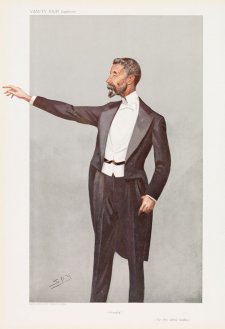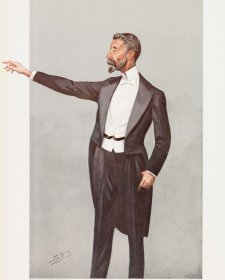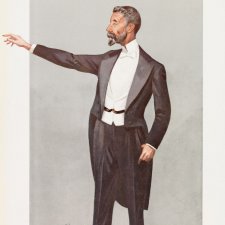- About us
- Support the Gallery
- Venue hire
- Publications
- Research library
- Organisation chart
- Employment
- Contact us
- Make a booking
- Onsite programs
- Online programs
- School visit information
- Learning resources
- Little Darlings
- Professional learning
William Lygon, seventh Earl Beauchamp (1872–1938) was the twentieth governor of New South Wales. London-born and educated at Eton and Oxford, he succeeded his father as Earl Beauchamp at age nineteen and was 23 when he entered public life as the mayor of Worcester. Politically progressive, he claimed on his appointment to the position of New South Wales governor that he ‘scarcely knew where the colony was and certainly nothing about it’. Indeed, he claimed to have considered the job offer ‘so ridiculous’ that he came close to refusing it. Unsurprisingly, on arriving in Sydney in May 1899, he offended locals with his allusions to the colony’s convict origins and other gaffes. Though caricatured by the Bulletin, Beauchamp was spoken of by his friend Henry Lawson as ‘a fine, intelligent cultured gentleman’ who ‘understood and loved the bush people of Australia’, and he was noted for the tact with which he responded to crises such as the outbreak of bubonic plague in Sydney in 1900. He left in October 1900, eighteen months into his term, but did not return to Sydney before it concluded in November 1901. He remained in politics on his return to England, spending the last years of his life in exile in Europe and the USA when threatened with legal proceedings that would have exposed his homosexuality.
Gift of Ronald A Walker 2009. Donated through the Australian Government's Cultural Gifts Program.
Sir Leslie Ward (age 48 in 1899)
William Lygon, 7th Earl Beauchamp (age 27 in 1899)
Ronald Walker (23 portraits)



On one level The Companion talks about the most famous and frontline Australians, but on another it tells us about ourselves.



Ashleigh Wadman rediscovers the Australian characters represented with a kindly touch by the British portrait artist Leslie Ward for the society magazine Vanity Fair.



Visit us, learn with us, support us or work with us! Here’s a range of information about planning your visit, our history and more!